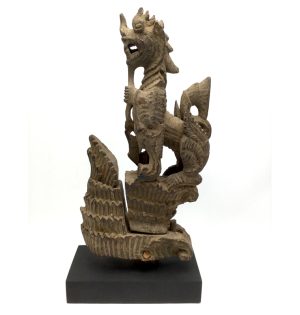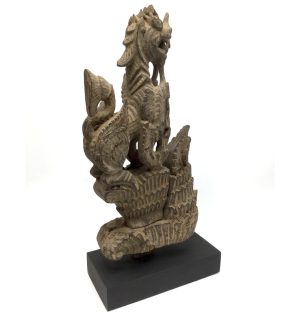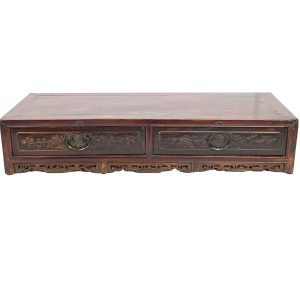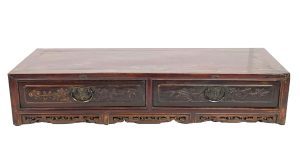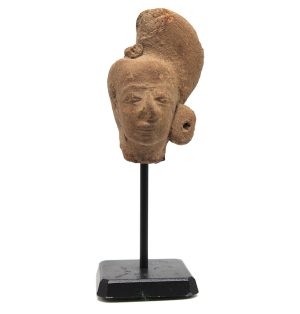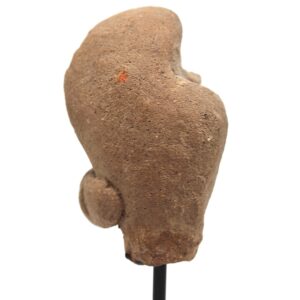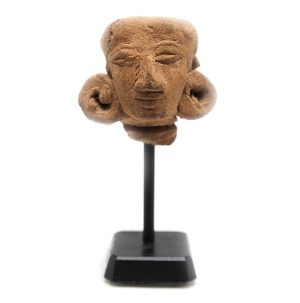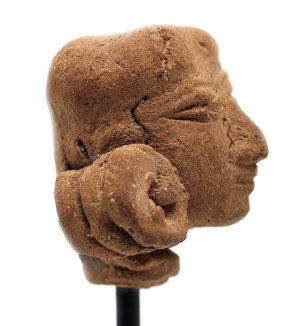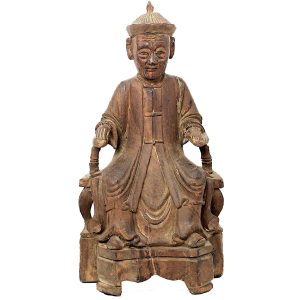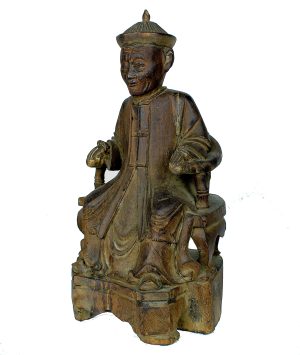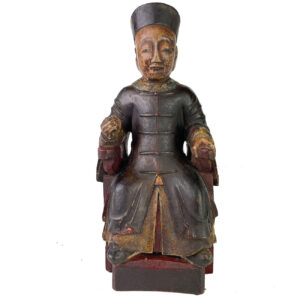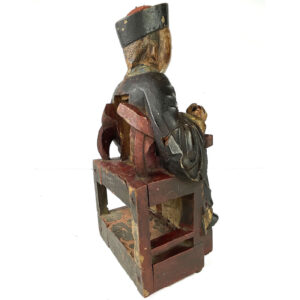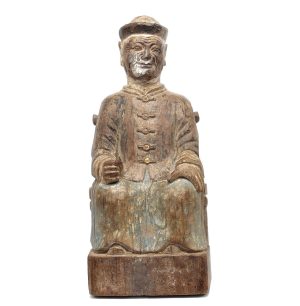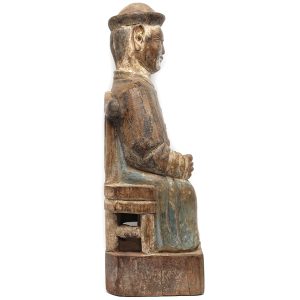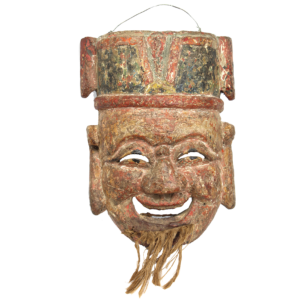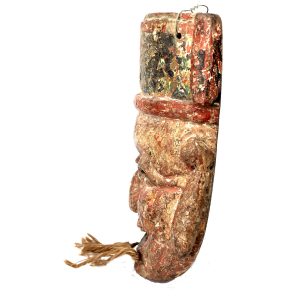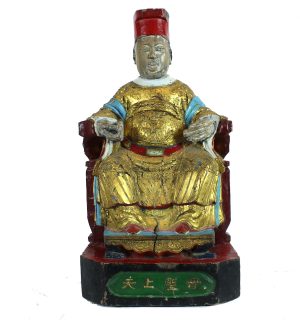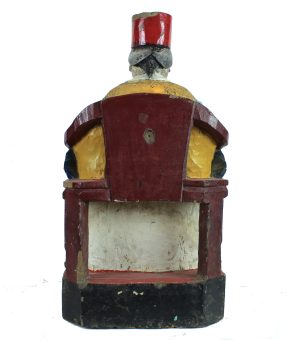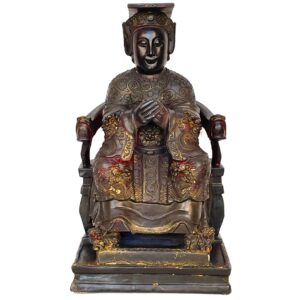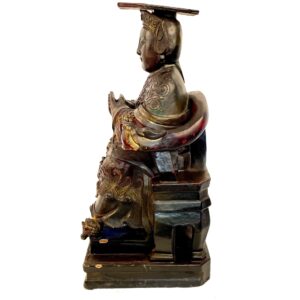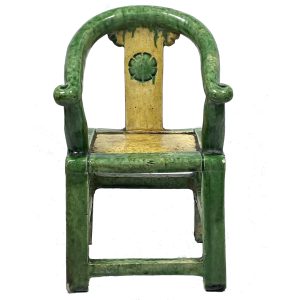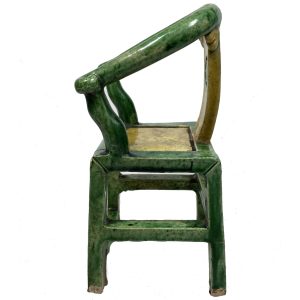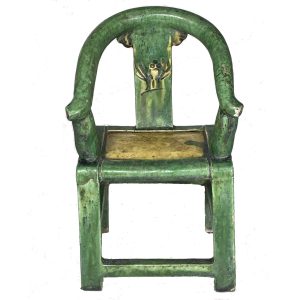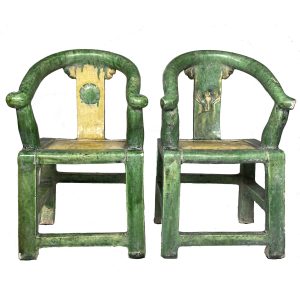Showing 109–120 of 434 results
-


$325.00
H: 14.5” W: 17.75” D: 3.375” | FREE SHIPPING WITHIN CONTINENTAL U.S.!
Finely carved figures were attached to ox cart yokes to protect farmers from malevolent spirits who inhabited all seen/unseen sectors of their world. . This beautifully carved ox cart yolk image is a chinthe, a mythical Burmese lion/dragon creature commonly decorating many everyday items. A propitious spiritual and protective guardian, the animalsymbolizes power, courage, and strength. This carving displays the common traits of a lions with a long face, large eyes, a long sharp nose, a lion-like beard, and a flame-like shape on the top of his head. Masterfully carved with careful attention to details, see the deeply incised hairs that cover his body. The 2-part piece is held together with a wooden plug. Though for daily use, Burmese craftsmen created beautiful objects and finished them with the best materials they could afford.
-
Sale!


$595.00 Original price was: $595.00.$375.00Current price is: $375.00.
H: 5.625″ W: 27.875″ D: 9.75″ | CALL 213-568-3030 OR EMAIL [email protected] FOR SHIPPING
Charming antique low profile lacquered finished chest adds warmth to any setting. Drawers with carved auspicious symbols for the Five Happinesses include peonies, vines, butterflies, plum blossom and a Japanese lily. Inset panel with florals and decorative apron and brass butterfly handles.
-
Sale!


$195.00 Original price was: $195.00.$135.00Current price is: $135.00.
Ht: 4” W: 1.5” D: 1.75”|FREE SHIPPING WITHIN CONTINENTAL U.S.
Javanese terracotta head part of bas-relief frieze from Majapahit Empire. Most unearthed figures were small decapitated heads with Javanese facial features, hairstyles, large ear ornamentations of upper classes. A great small piece of history.
-
Sale!


$195.00 Original price was: $195.00.$135.00Current price is: $135.00.
H: 2.75″ W:1.375 ” D:1.25″ | FREE SHIPPING WITHIN CONTINENTAL U.S.
Crafted during the Majapahit Empire in Java this rare head was part of a bas-relief frieze decapitated as part of religious offerings.
-
Sale!


$695.00 Original price was: $695.00.$595.00Current price is: $595.00.
H: 12.75” W: 6.625” D: 5.75” | FREE SHIPPING within Continental u.s.
Masterfully carved ancestor mandarin official on horseshoe chair in the round with cabriole legs, considered a “marker of high status, finely dressed in long Mandarin coat and pointed rattan hat. Benevolent face was homage to a revered family member. It is one of our favorite ancestor figures.
-
Sale!


$455.00 Original price was: $455.00.$295.00Current price is: $295.00.
H:8.5 ” W: 4 ” D: 3.3 ” | FREE SHIPPING WITHIN CONTINENTAL U.S.
This ancestor figure official sits on a horseshoe chair showing his status wearing official’s attire: 5-button Mandarin long coat with a round collar and woven hat. Has a personalized tranquil face with a hint of a smile.
-
Sale!


$595.00 Original price was: $595.00.$485.00Current price is: $485.00.
H: 11.5″ W: 5″ D: 4″ | FREE SHIPPING WITHIN CONTINENTAL U.S.
The finely carved ancestor figure in traditional Qing dynasty high neck Mandarin official’s long jacket with front buttons and official rattan woven headwear. The chair’s back slat was omitted as back carved cavity for consecration in an eye-opening ceremony
-
Sale!


$595.00 Original price was: $595.00.$475.00Current price is: $475.00.
H: 10.5” W:7.75” D: 3” | FREE SHIPPING WITHIN CONTINENTAL US
This antique Nuo Opera mask is Tudi Gong, benevolent Earth god with smiling animated face, long eyebrows, hemp beard and high decorative hat. With an honest gentle disposition, he symbolizing the power of good to defeat evil. Nuo popular in Ming/ Qing dynasties, there are few remaining troupes.
-
Sale!


$1,150.00 Original price was: $1,150.00.$875.00Current price is: $875.00.
H: 19.25″ W: 10″ D: 8.75″ |CALL 213-568-3030 OR EMAIL [email protected] FOR SHIPPING.
Seated imperiously on a horseshoe chair with carved title “Holy Mother in Heaven,” Mazu is depicted in the imperial style, with a regal flat topped headdress, elaborate robes with dragons, official’s girdle in red and gilt.
-
Sale!


$1,050.00 Original price was: $1,050.00.$650.00Current price is: $650.00.
H: 15.375” W: 8.625” D: 7.5” | CONTACT US AT 213-568-3030 or email [email protected] for SHIPPING.
Mazu, protector of sea, is portrayed as the imperially sanctioned “Empress of Heaven” on an elaborate, horseshoe shaped dragon throne, holding a hu tablet, with elegant dragon robes, official’s girdle, Empress headdress and small feet on gilt fu lion foot rest.
-
Sale!


$685.00 Original price was: $685.00.$395.00Current price is: $395.00.
H: 7.375″ W: 4.375″ D: 3.75″ | FREE SHIPPING WITHIN CONTINENTAL U.S.!
Horseshoe chairs were considered a sign of rank used by officials and often ancestral figures were portrayed sitting in them to reflect their high status. This well-modeled green glaze ceramic mingqi of a horseshoe chair is decorated with a yellow glaze imitating caning and the decorative carved circular design on the splat. It pairs perfectly with Ming Dynasty Earthenware Horseshoe Chair 3330 and together would add to a fine collection of miniature Chinese ceramics.
-
Sale!


$685.00 Original price was: $685.00.$395.00Current price is: $395.00.
H: 7.375″ W: 4.375″ D: 3.75″ | FREE SHIPPING WITHIN CONTINENTAL U.S.!
Horseshoe chairs were considered a sign of rank used by officials and often ancestral figures were portrayed sitting in them to reflect their high status. This well-modeled green glaze ceramic mingqi of a horseshoe chair is decorated with a yellow glaze imitating caning and the decorative carved circular design on the splat. It pairs well with item Ming Earthenware Horseshoe Chair 3331. This would be a fine addition to a collection of antique ceramics or simply a beautiful decorative piece to brighten a small space.
End of content
End of content

